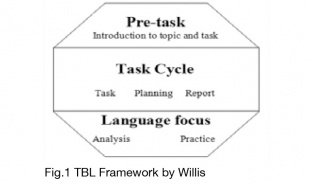- Home
- Faculty Members
- Organization for Fundamental Education
- Robert Hennesey
Organization for Fundamental Education
- Key words
- Task-Based Language Teaching

Bachelor of Industrial Design, Master’s degree in TEFL / Assistant Professor
Robert Hennesey
Education
University of Birmingham
Professional Background
Masters Degree, Teaching English as a Foreign Language
Consultations, Lectures, and Collaborative Research Themes
The effects of presenting on Pair work and student output
Main research themes and their characteristics
「Student Pair work within a Task-Based English classroom」
One of the aspects of a Task-Based framework (figure 1) that most interested me was the Report phase. The report phase is a part of student planning before their oral presentation in a task cycle. Student reluctance to perform or present their work orally is something which I sympathise with having been a language student myself and felt that same shyness in class when using French.
My research aimed to better understand what exactly happens during pair-work before a presentation, and if the pressure to present work impacts on student preparation. I looked particularly at how the pressure to present effects student engagement and output. My research questions were;
“What effects does the requirement to present work orally versus not present work orally to the teacher have on student effort and planning in the pair work phase of task-based lessons?” and secondly “Does having to present pair work orally lead to greater language output?”
By collecting and analysing audio, video and written feedback from FUT students in attempting two separate tasks I was able to see a marked increase in output as measured by word count for presenting pairs (see table 1). I also recognised the following;
Use of time: During pair work, individuals and pairs wasted more time daydreaming and chatting about unrelated topics when not required to present their work orally. Non-presenting pairs wasted on average 3 minutes or more off task compared to those pairs required to present.
Spontaneity: Language was less spontaneous and ideas less fluid in pair work when required to present orally. Although all students were instructed not to use smartphones and translators, presenting pairs used phones 35.29% more than non-presenting pairs.
Practice: Whether pairs practiced the dialogue they had created after preparing it depended greatly on the requirement to present. The majority of presenting pairs rehearsed the dialogue when they finished composing it. There is a 175% increase in the rehearsal of material when pairs are required to present orally.
Scaffolding: Instances of scaffolding were noted more so in presenting pairs.
While different scholars have conflicting opinions as to the value of pair work, having conducted this research I better understand what actually happens in the classroom when relatively low proficiency students are asked to prepare English language in pairs and how their behaviour is effected by a looming presentation phase.


